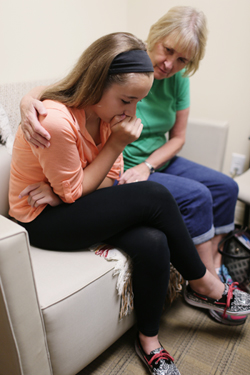10 Tips to Help Kids Cope With Violence
 It’s a sad fact that violence has increasingly worked its way into our society. Hardly a day goes by when there isn’t news of a bomb threat or a shooting that occurs on a neighborhood street, at a school or another public place typically deemed safe.
It’s a sad fact that violence has increasingly worked its way into our society. Hardly a day goes by when there isn’t news of a bomb threat or a shooting that occurs on a neighborhood street, at a school or another public place typically deemed safe.
As news reports relay stories of innocent bystanders, including children, being injured or killed, we find ourselves feeling anxious, saddened and helpless about how to protect ourselves and the ones we love.
Children absorb the news, as well, but they may not be able to verbalize their feelings about what they’re seeing and hearing. Parents may ask you, as their child’s pediatrician, for advice on how best to handle this sensitive situation. Julie Bemerer, PsyD, a staff psychologist at Cincinnati Children’s, offers the following tips to share with parents for talking with kids about their fears when a shooting or other traumatic event occurs.
- Talk about the event with your child. Silence isn’t comforting in crisis situations and suggests that what has occurred is too horrible to even speak of. After a major crisis, even very young children have likely already heard what has happened – but they may not understand what it means.
- Follow your child’s lead in communicating. Let them talk first. Ask what they have heard about the event. Correct inaccurate information/conclusions. Listen to their questions and limit your response to what they ask. Young children want simple but accurate answers. Too much information can be overwhelming. Speak at your child’s developmental level – trust your gut about what they can handle.
- If your child expresses worry, sadness or fear, tell them what adults are doing to keep them safe. Don’t provide false reassurance or dismiss their concerns. Help them identify ways to cope with difficult feelings.
- Minimize exposure to media. Consider recording, screening and watching the news with your child. Remember, children often overhear or see what you’re watching on TV or listening to on the radio and may be exposed directly as the news evolves on the internet or social media. While they may seek and benefit from basic information about what happened, neither kids nor adults benefit from graphic details or exposure to disturbing images or sounds. The aftermath of a crisis is a good time to disconnect from all media and sit down together and talk as a family.
- Encourage your child to ask questions, and answer the questions directly. Like adults, children are better able to cope with a crisis if they feel they understand it.
- Share your feelings about violence with your child and how you cope with your own concerns. If you feel overwhelmed and/or hopeless, look for support from other adults before reaching out to your child.
- Reassure your child that feeling sad, worried or angry is okay. Use the conversation as an opportunity to talk about other troubling feelings your child may have.
- Don’t feel obligated to give a reason for what happened. Although adults often feel the need to explain why someone committed a crime, many times they don’t know, and it’s okay not to know.
- Take care of yourself. Confide in other adults about the intensity of your fears/anxieties. Children pick up on your cues. If you can remain calm and continue with your regular routines, your child’s fears will be eased.
- If you have concerns about your child’s behavior, contact your pediatrician or a qualified mental healthcare specialist.
To make a referral to Behavioral Medicine and Clinical Psychiatry, call 513-636-4336.



